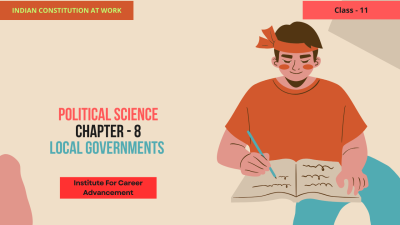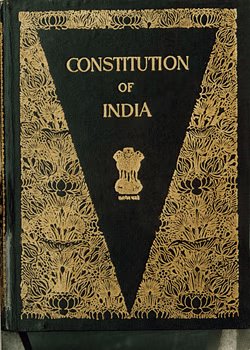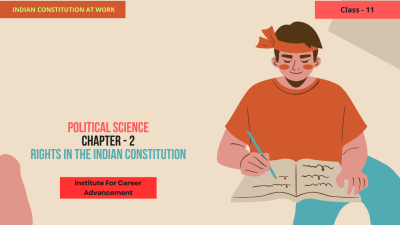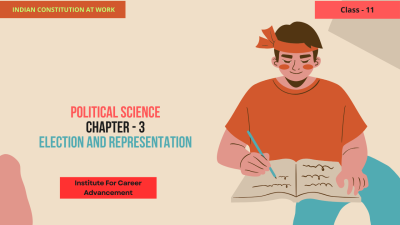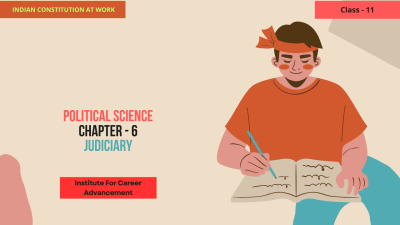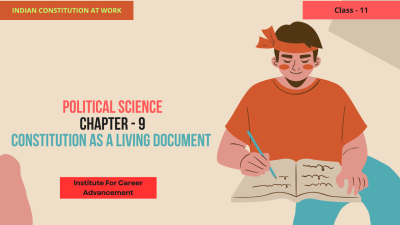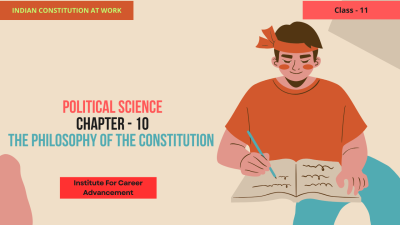Course description
The topic of Local Governments is covered in the Class 11 Political Science syllabus under the NCERT textbook Indian Constitution at Work. This topic introduces students to the concept of decentralization and the importance of local self-governments in a democratic country like India. It explores the role and structure of Panchayati Raj institutions and Municipalities, established through the 73rd and 74th Constitutional Amendments.
Key Topics in Local Governments:
1. Meaning and Importance of Local Governments
Definition: Local governments are institutions at the grassroots level that govern smaller units like villages, towns, and cities.
Need for Local Government: Local governments allow for better governance by ensuring that decisions are made close to the people, especially in large and diverse countries. It brings government closer to citizens and helps in addressing local needs more efficiently.
Decentralization: The process of distributing power from the central and state governments to lower levels of government, giving more authority to local bodies.
2. Evolution of Local Government in India
Local governments in India have historical roots, but their modern form emerged after independence.
Pre-independence efforts: Mahatma Gandhi advocated for village panchayats as the foundation of self-governance.
Post-independence developments: The Indian Constitution initially included provisions for local governments, but they lacked strong autonomy and resources until later reforms.
3. 73rd and 74th Constitutional Amendments (1992)
73rd Amendment (Panchayati Raj Institutions):
Established a three-tier system of Panchayati Raj in rural areas: Gram Panchayats (village level), Panchayat Samitis (block level), and Zilla Parishads (district level).
Introduced compulsory elections every five years.
Provided for reservation of seats for Scheduled Castes (SCs), Scheduled Tribes (STs), and women.
Gave local governments powers related to 29 subjects listed in the Eleventh Schedule (e.g., agriculture, education, public health).
74th Amendment (Urban Local Bodies):
Established Municipalities in urban areas, including Nagar Panchayats (for transitional areas), Municipal Councils (for smaller urban areas), and Municipal Corporations (for larger urban areas).
Focused on urban planning, public health, and economic development.
Like the 73rd Amendment, it ensured the reservation of seats for marginalized groups and women.
4. Structure and Functions of Panchayati Raj Institutions (PRIs)
Gram Panchayat: The basic unit of local governance in rural areas, responsible for local development, infrastructure, and dispute resolution at the village level.
Panchayat Samiti: The intermediate tier at the block level, coordinating development activities for a group of villages.
Zilla Parishad: The top-tier body at the district level, overseeing and managing development projects across the district.
5. Structure and Functions of Urban Local Bodies (ULBs)
Municipal Corporation: Governs large urban areas, handling services like water supply, waste management, infrastructure development, and public health.
Municipal Council: Operates in smaller urban areas, with responsibilities similar to Municipal Corporations but on a smaller scale.
Nagar Panchayat: Established for areas in transition from rural to urban, handling local governance needs of smaller towns.
6. Powers and Responsibilities of Local Governments
Local governments are responsible for tasks like:
Infrastructure development (roads, water supply, sanitation).
Primary education, healthcare, and social welfare.
Local economic development and land use planning.
Public amenities like markets, parks, and street lighting.
7. Financial Autonomy of Local Governments
Sources of Revenue: Taxes (property tax, water tax, etc.), grants from the state and central governments, and local service fees.
Challenges: Many local governments struggle with financial autonomy and are dependent on state and central grants. This can limit their ability to carry out development projects effectively.
8. Role of State Governments and the Central Government
State Governments: Oversee and guide the functioning of local governments, provide financial resources, and ensure that elections are held regularly.
Central Government: Provides constitutional support and financial assistance through schemes like the Mahatma Gandhi National Rural Employment Guarantee Act (MGNREGA) and the Smart Cities Mission.
9. Challenges Faced by Local Governments
Lack of Funds: Despite constitutional provisions, local governments often face financial constraints, limiting their capacity to carry out development activities.
Administrative Capacity: Local governments may lack trained staff and technical expertise to handle complex tasks.
State Interference: Local governments sometimes face excessive interference from state governments, reducing their autonomy.
এন. সি. ই. আর. টি-র পাঠ্যপুস্তক 'ইন্ডিয়ান কনস্টিটিউশন অ্যাট ওয়ার্ক "-এর অধীনে একাদশ শ্রেণির রাষ্ট্রবিজ্ঞানের পাঠ্যক্রমে স্থানীয় সরকার বিষয়টিকে অন্তর্ভুক্ত করা হয়েছে। এই বিষয়টি শিক্ষার্থীদের বিকেন্দ্রীকরণের ধারণা এবং ভারতের মতো গণতান্ত্রিক দেশে স্থানীয় স্বায়ত্তশাসনের গুরুত্বের সাথে পরিচয় করিয়ে দেয়। এটি 73 তম এবং 74 তম সাংবিধানিক সংশোধনীর মাধ্যমে প্রতিষ্ঠিত পঞ্চায়েতি রাজ প্রতিষ্ঠান এবং পৌরসভাগুলির ভূমিকা এবং কাঠামো অন্বেষণ করে।
স্থানীয় সরকারের মূল বিষয়ঃ 1. স্থানীয় সরকারের অর্থ ও গুরুত্ব
সংজ্ঞাঃ স্থানীয় সরকার হল তৃণমূল স্তরের প্রতিষ্ঠান যা গ্রাম, শহর এবং শহরের মতো ছোট ছোট ইউনিট পরিচালনা করে।
স্থানীয় সরকারের প্রয়োজনীয়তাঃ স্থানীয় সরকারগুলি জনগণের কাছাকাছি, বিশেষত বড় এবং বৈচিত্র্যময় দেশগুলিতে সিদ্ধান্ত নেওয়া হয় তা নিশ্চিত করে উন্নত প্রশাসনের অনুমতি দেয়। এটি সরকারকে নাগরিকদের কাছাকাছি নিয়ে আসে এবং স্থানীয় চাহিদা আরও দক্ষতার সাথে মেটাতে সহায়তা করে।
বিকেন্দ্রীকরণঃ কেন্দ্রীয় ও রাজ্য সরকারের কাছ থেকে সরকারের নিম্ন স্তরে ক্ষমতা বিতরণের প্রক্রিয়া, যা স্থানীয় সংস্থাগুলিকে আরও বেশি কর্তৃত্ব দেয়।
2. ভারতে স্থানীয় সরকারের বিবর্তন
ভারতে স্থানীয় সরকারগুলির ঐতিহাসিক শিকড় রয়েছে, তবে তাদের আধুনিক রূপ স্বাধীনতার পরে আবির্ভূত হয়েছিল।
স্বাধীনতা-পূর্বের প্রচেষ্টাঃ মহাত্মা গান্ধী স্বায়ত্তশাসনের ভিত্তি হিসাবে গ্রাম পঞ্চায়েতের পক্ষে ছিলেন।
স্বাধীনতা-পরবর্তী উন্নয়নঃ ভারতীয় সংবিধানে প্রাথমিকভাবে স্থানীয় সরকারগুলির জন্য বিধান অন্তর্ভুক্ত ছিল, কিন্তু পরবর্তী সংস্কারের আগে পর্যন্ত তাদের শক্তিশালী স্বায়ত্তশাসন এবং সম্পদের অভাব ছিল।
3. 73তম ও 74তম সংবিধান সংশোধনী (1992)
73তম সংশোধনী (পঞ্চায়েতি রাজ প্রতিষ্ঠান) গ্রামীণ অঞ্চলে পঞ্চায়েতি রাজের একটি ত্রিস্তরীয় ব্যবস্থা প্রতিষ্ঠা করেছেঃ গ্রাম পঞ্চায়েত (গ্রাম স্তর) পঞ্চায়েত সমিতি (ব্লক স্তর) এবং জেলা পরিষদ। (district level).
প্রতি পাঁচ বছর অন্তর বাধ্যতামূলক নির্বাচন চালু করা হয়।
তফসিলি জাতি (এসসি) তফসিলি উপজাতি (এসটি) এবং মহিলাদের জন্য আসন সংরক্ষণের ব্যবস্থা করা হয়েছে।
একাদশ তফসিলে তালিকাভুক্ত 29টি বিষয় সম্পর্কিত স্থানীয় সরকারকে ক্ষমতা প্রদান করেছেন (e.g., agriculture, education, public health).
74তম সংশোধনী (নগর স্থানীয় সংস্থা) নগর পঞ্চায়েত (অন্তর্বর্তী অঞ্চলের জন্য) পৌর পরিষদ (ছোট শহুরে অঞ্চলের জন্য) এবং পৌর কর্পোরেশন সহ শহরাঞ্চলে পৌরসভা প্রতিষ্ঠা করে। (for larger urban areas).
নগর পরিকল্পনা, জনস্বাস্থ্য এবং অর্থনৈতিক উন্নয়নের দিকে মনোনিবেশ করা।
73তম সংশোধনীর মতো, এটি প্রান্তিক গোষ্ঠী এবং মহিলাদের জন্য আসন সংরক্ষণ নিশ্চিত করেছে।
4. পঞ্চায়েতি রাজ প্রতিষ্ঠানের কাঠামো ও কার্যাবলী (PRIs)
গ্রাম পঞ্চায়েতঃ গ্রামাঞ্চলে স্থানীয় প্রশাসনের মৌলিক একক, যা স্থানীয় উন্নয়ন, পরিকাঠামো এবং গ্রাম পর্যায়ে বিরোধ নিষ্পত্তির জন্য দায়ী।
পঞ্চায়েত সমিতিঃ ব্লক স্তরে মধ্যবর্তী স্তর, গ্রামের একটি গোষ্ঠীর জন্য উন্নয়নমূলক কার্যক্রমের সমন্বয় সাধন করে।
জেলা পরিষদঃ জেলা পর্যায়ে শীর্ষ স্তরের সংস্থা, জেলা জুড়ে উন্নয়ন প্রকল্পগুলির তদারকি ও পরিচালনা করে।
5. নগর স্থানীয় সংস্থাগুলির কাঠামো ও কার্যাবলী (ULBs)
পৌর নিগমঃ জল সরবরাহ, বর্জ্য ব্যবস্থাপনা, পরিকাঠামো উন্নয়ন এবং জনস্বাস্থ্যের মতো পরিষেবাগুলি পরিচালনা করে বড় শহুরে অঞ্চলগুলি পরিচালনা করে।
পৌর পরিষদঃ পৌর কর্পোরেশনের মতো কিন্তু ছোট আকারে দায়িত্ব নিয়ে ছোট শহুরে এলাকায় কাজ করে।
নগর পঞ্চায়েতঃ গ্রামীণ থেকে শহুরে অঞ্চলে রূপান্তরিত অঞ্চলগুলির জন্য প্রতিষ্ঠিত, ছোট শহরগুলির স্থানীয় প্রশাসনের চাহিদা পরিচালনা করে।
6টি। স্থানীয় সরকারের ক্ষমতা ও দায়িত্ব
স্থানীয় সরকারগুলি নিম্নলিখিত কাজগুলির জন্য দায়বদ্ধঃ পরিকাঠামো উন্নয়ন। (roads, water supply, sanitation).
প্রাথমিক শিক্ষা, স্বাস্থ্যসেবা এবং সমাজকল্যাণ।
স্থানীয় অর্থনৈতিক উন্নয়ন এবং ভূমি ব্যবহার পরিকল্পনা।
বাজার, পার্ক এবং রাস্তার আলোর মতো জনসাধারণের সুযোগ-সুবিধা।
7. স্থানীয় সরকারের আর্থিক স্বায়ত্তশাসন
রাজস্বের উৎসঃ কর (সম্পত্তি কর, জল কর ইত্যাদি) ) রাজ্য ও কেন্দ্রীয় সরকার থেকে অনুদান এবং স্থানীয় পরিষেবা ফি। চ্যালেঞ্জঃ অনেক স্থানীয় সরকার আর্থিক স্বায়ত্তশাসনের সঙ্গে লড়াই করে এবং রাজ্য ও কেন্দ্রীয় অনুদানের উপর নির্ভরশীল। এটি কার্যকরভাবে উন্নয়ন প্রকল্পগুলি সম্পাদনের ক্ষেত্রে তাদের ক্ষমতাকে সীমাবদ্ধ করতে পারে।
8. রাজ্য সরকার এবং কেন্দ্রীয় সরকারের ভূমিকা
রাজ্য সরকারঃ স্থানীয় সরকারের কাজকর্ম তদারকি ও পরিচালনা করা, আর্থিক সংস্থান সরবরাহ করা এবং নিয়মিতভাবে নির্বাচন অনুষ্ঠিত হয় তা নিশ্চিত করা।
কেন্দ্রীয় সরকারঃ মহাত্মা গান্ধী জাতীয় গ্রামীণ কর্মসংস্থান গ্যারান্টি আইন (এমজিএনআরইজিএ) এবং স্মার্ট সিটি মিশনের মতো প্রকল্পের মাধ্যমে সাংবিধানিক সহায়তা এবং আর্থিক সহায়তা প্রদান করে।
9টি। স্থানীয় সরকারগুলির সামনে চ্যালেঞ্জ
তহবিলের অভাবঃ সাংবিধানিক বিধান থাকা সত্ত্বেও, স্থানীয় সরকারগুলি প্রায়শই আর্থিক সীমাবদ্ধতার মুখোমুখি হয়, যার ফলে তাদের উন্নয়নমূলক কার্যক্রম পরিচালনার ক্ষমতা সীমিত হয়ে পড়ে।
প্রশাসনিক সক্ষমতাঃ স্থানীয় সরকারগুলিতে জটিল কাজগুলি পরিচালনা করার জন্য প্রশিক্ষিত কর্মী এবং প্রযুক্তিগত দক্ষতার অভাব থাকতে পারে।
রাষ্ট্রীয় হস্তক্ষেপঃ স্থানীয় সরকারগুলি কখনও কখনও রাজ্য সরকারগুলির অত্যধিক হস্তক্ষেপের সম্মুখীন হয়, যার ফলে তাদের স্বায়ত্তশাসন হ্রাস পায়।

